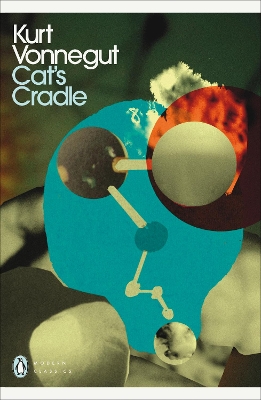Reviewed by Michael @ Knowledge Lost on
Like most of Kurt Vonnegut’s books that I’ve read (with the exception of Breakfast of Champions) Cat’s Cradle is this bizarre journey that isn’t necessarily enjoyable to read but when you finish the book and reflect you start to see the brilliance. I remember with Slaughterhouse-Five when I ended the book I gave it a 2 star rating; it was just plain weird but the book never left my thoughts. I digested what I had read and began to understand and slowly that rating grew and now I think it is a work of genius.
As Cat’s Cradle begins to twist and turn in true Vonnegut style you eventually end up in the bizarre and fictitious island of San Lorenzon. The book continues with more twists until it becomes apparent that Ice-Nine can be a very destructive material. The novel is laced in laced with irony and parody, this is part of Vonnegut’s satirical humour and you have to except that he knows what he is doing and let him take you on this journey.
What I think Kurt Vonnegut and the narrator of Cat’s Cradle is trying to tell us as readers is the discovery of Ice-Nine can truly benefit mankind but then you find a military application for it and everything changes. This is a warning, with the amazing advances in technology without any growth in an ethical awareness human annihilation is a real possibility. Vonnegut was living in the Nuclear age when this book was written, the threats felt real and it was what had most people worried. The confrontation between technology and morality is ever present within this modern classic.
But there is a parallel (but similar) message running through Cat’s Cradle as well. John is often known as Jonah in the novel and you have to think biblical for this one. Jonah is a biblical prophet that goes to Nineveh (after much drama) and tells them of their destruction. The people repent and God takes pity on them and the city is spared. A symbolic message; a cautionary warning to the readers of Jonah’s (aka John) prophetic findings that could lead to the end of the world.
In true Vonnegut form, this book will take you on an interesting ride with no possible way of predicting the outcome. The book satirises science, technology, the arms race and even organised religion in this classic post-modern sci-fi novel. It is always hard to talk about a Vonnegut book or even try to explain his literary style, but if you like a dark comedy, science fiction or satire novel then Kurt Vonnegut is always a good choice. I would recommend starting with Slaughterhouse-Five as that is probably considered his magnum opus. Although I wasn’t a fan of Breakfast of Champions, I feel like I’m a true fan of what Vonnegut does and Cat’s Cradle is a good example of that.
This review originally appeared on my blog; http://literary-exploration.com/2013/07/30/book-of-the-month-cats-cradle/
Reading updates
- Started reading
- 26 July, 2010: Finished reading
- 26 July, 2010: Reviewed
